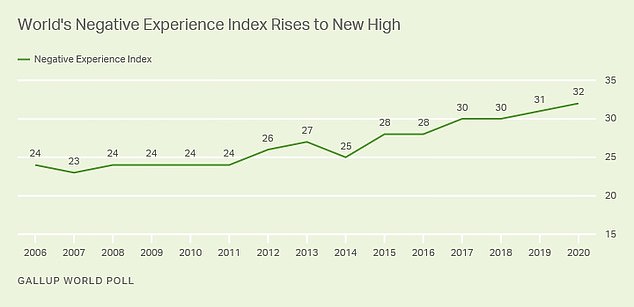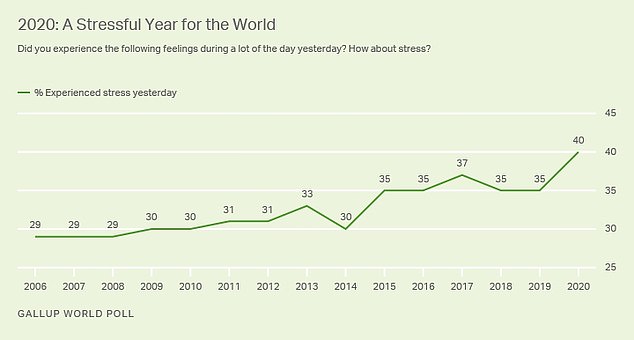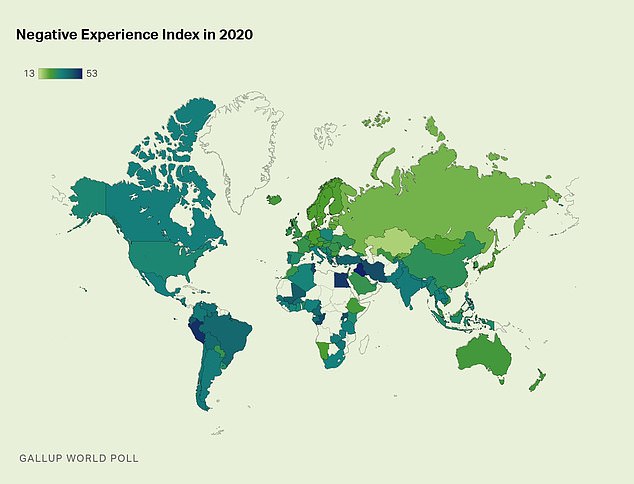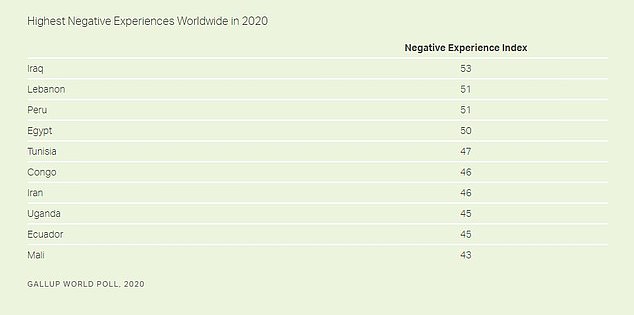The world had the most negative year on record in 2020, according to global polling from Gallup.
Gallup’s ‘Negative Experience Index’ reached its highest number in 15 years, with 40 percent of survey respondents saying they were worried and 40 percent saying they were stressed.
Some countries had much worse experiences than the global average – Iraq, Lebanon, and Peru scored the highest on the Negative Experience Index at 53 points, 51 points, and 51 points, compared to the global score of 32.
And it’s not just the pandemic to blame. The 2020 data continue a negative pattern from the past ten years – the world had already set a record score of 31 in 2019.

2020 was the year of negative emotions, according to Gallup

Around the world, people experienced stress, worry, and other negative feelings on a massive scale
2020 was the year of negative emotions, according to new polling from Gallup.
The research agency tracks sadness, worry, and other negative emotions with an annual ‘Negative Experience Index’ based on global polling.
That index reached a new, 15-year high in 2020.
While the COVID-19 pandemic is certainly a key culprit in such negative experiences, a closer look at Gallup’s data suggests that other factors are also to blame.
Gallup’s Negative Experience Index poll includes surveys of almost 160,000 people in 115 countries, conducted in 2020 and 2021.
To select respondents for the surveys, Gallup researchers looked at nationally representative samples of the adult population in each country.
In every phone interview, the researchers asked respondents if they had experienced five negative emotions on the previous day: worry, stress, physical pain, sadness, and anger.
During the 2020 survey, respondents were most likely to say they were experiencing worry and stress – 40 percent said they were worried, and 40 percent said they were stressed.
Out of all 160,000 respondents, 29 percent said they were experiencing physical pain, 27 percent said they were sad, and 24 percent said they were angry.
Overall, these survey responses averaged out to a global Negative Experience Index score of 32 – higher than any score recorded by Gallup in 15 years of polling.
Almost all values were higher in 2020 than in the previous year, with stress seeing the highest jump – from 35 percent in 2019 to 40 percent in 2020.
This five percent jump represents an additional 190 million people globally, Gallup researchers said.

The number of poll respondents who said they were stressed jumped from 35 percent in 2019 to 40 percent in 2020
People in some countries were far more likely to cite negative experiences than others.
Iraq, Lebanon, and Peru scored the highest on the Negative Experience Index at 53 points, 51 points, and 51 points.
Peru has the highest Covid death rate of any country. The country has seen about 195,000 deaths, out of a population of 33 million.
Iraq, Lebanon, and other countries with high Negative Experience Index scores are facing political and economic turmoil – made worse by the pandemic.
Taiwan, on the other hand, had the lowest score at just 13. Along with Kazakhstan, Estonia, and other countries with low scores in 2020, Taiwan has consistently appeared at the bottom of this index.

Negative Experience Index values ranged from 13 in Taiwan to 53 in Iraq

Nations with higher scores on this index tended to have higher levels of political turmoil, made worse in many cases by the pandemic
Gallup researchers said that the pandemic was certainly a big driver for 2020’s record score. Around the world, people lost loved ones, faced economic hardship, and missed major experiences like school graduations.
But the pandemic wasn’t the only cause of this value.
The researchers noted that 2019 had already set a record, with a Negative Experience Index of 31 – and the world has been on a negative trajectory for a decade.
Other contributors might be increasing global hunger, lack of freedom, rising corruption, and income inequality, Gallup’s Global Managing Partner Jon Clifton wrote in a report on the Index.
‘Many countries that report high income inequality also happen to be the countries that report a lot of negative emotions, such as anger,’ Clifton said.
Clifton recommended that national leaders measure and respond to their countries’ emotional states, because negative emotions are ‘devastating for societies.’
Countries with higher negative scores tend to see more suicide deaths, abuse of drugs and alcohol, and other consequences.
While some nations may see more positive emotions in 2021 as vaccinations curb the pandemic’s impact, others are now seeing their highest Covid case numbers yet.
Source link : https://www.dailymail.co.uk/health/article-9807857/2020-year-negative-emotions-poll-finds.html











